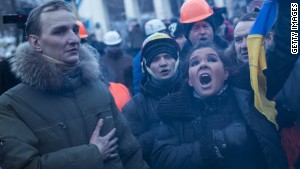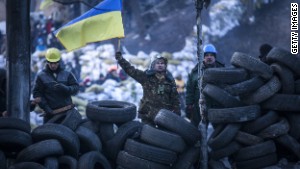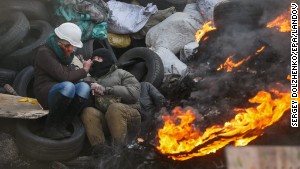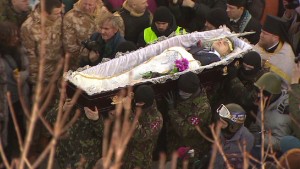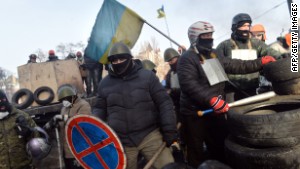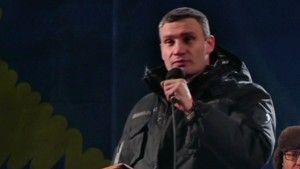Young and old, they have braved the freezing
cold for weeks to voice their discontent. Using snow, wood, metal and
tires, thousands of protesters have barricaded themselves into a
makeshift tent city, paralyzing central Kiev and refusing to leave until
their demands are met.
Undeterred by the
Ukrainian winter chill, the demonstrators chant day and night, sometimes
to the drumbeat of sticks on corrugated iron, and take to the stage to
give speeches, demanding the government's ouster and new elections.
For the past few weeks,
billowing smoke, large fires, burnt out tires and cars as well as
smashed windows of public buildings have become familiar scenes in the
snowy city as protests have plunged Ukraine, an eastern European country
of 45 million people, into a deep political crisis.
Some of the images beamed
around the world have been particularly dramatic -- protesters knocking
down a giant statue of the Russian revolutionary leader Vladimir Lenin
and hacking it with hammers to loud cheers, explosions reminiscent of a
war zone echoing around downtown Kiev, fierce clashes and abuse. One
protester, naked aside from his shoes, was seen being kicked and forced
onto a police bus.
The battlefield is
central Kiev, the power base of an opposition which is demanding change
in the former Soviet Union state. The lines have been drawn.
Batons have been raised
on both sides -- between the protesters armed with petrol bombs and
stones and shielded riot police firing tear gas and rubber bullets --
sometimes resulting in deadly clashes.
But despite a crackdown,
demonstrators' morale is high with no sign of their labyrinth of tents,
railings and metal barrels that have taken up Kiev's central arteries
being dismantled just yet.
It has been two months
since the first rattled demonstrators took to the streets, underscoring
tensions in a country split between Europe and Russia. But Ukraine's
political unrest seems to be worsening by the day -- drawing concern
from its neighbors, Western European states and Washington.
Here are some key questions about Ukraine's political unrest.
What sparked the protests?
The protests began in
November as a pro-Europe gesture, underscoring the tensions in a country
split between pro-European regions in the West and a more
Russia-oriented East.
Thousands spilled onto
the streets after President Viktor Yanukovych did a U-turn over a trade
pact with the European Union that had been years in the making --
favoring closer relations with Russia instead.
Angered by this
backpedaling, the demonstrators demanded the EU deal be signed, saying
it would strengthen cooperation with the bloc.
Their daily protests soon escalated, drawing parallels to Ukraine's 2004 Orange Revolution, which toppled the government.
But with Ukraine
desperately in need of a cash injection, Kiev cited the need for
financial assistance if it were to do business with the EU. Yanukovych,
in power since 2010, said Ukraine could not afford to sign the deal,
alluding to economic pressure from Russia.
Another factor in
Yanukovych's decision not to sign the deal is likely to have been the
EU's demands that he free from jail former Prime Minister Yulia
Tymoshenko, his political opponent. The Orange Revolution that swept him
from office in 2004, when he was prime minister, also swept Tymoshenko
to power.
Soon afterward, he flew
to Moscow where he and President Vladimir Putin announced Russia would
buy $15 billion in Ukrainian debt and slash the price Kiev pays for its
gas.
While unhappy with that,
what inflamed the demonstrators even more, however, was the adoption of
a sweeping anti-protest law by the parliament on January 16.
The new law included
provisions barring people from wearing helmets and masks to rallies and
from setting up tents or sound equipment without prior police
permission.
This sparked concerns it
could be used to put down demonstrations and deny people the right to
free speech -- and clashes soon escalated.
Last week, several people were killed and hundreds of others injured in heavy street fighting.
The epicenter of the
protests has been Kiev's central Independence Square, Maidan, but the
demonstrators have also blocked other streets and government buildings.
On Sunday, they briefly seized the justice ministry.
"The changes that
occurred after the Orange Revolution weren't simply deep enough. This
time around, it appears that the disenchantment is so strong that there
is a genuine opportunity to make a fresh start," said Dalibor Rohac,
policy analyst with the Cato Institute's Center for Global Liberty and
Prosperity.
"For Ukrainians this is a
chance to get on a different trajectory from the one the country has
been on for the past 22 years and become eventually a part of
prosperous, democratic Europe."
What's being done to try to reach an end to the fighting?
The leaders of three
opposition factions have met several times with Yanukovych and a
government working group to try to resolve the crisis.
They are former boxer
Vitali Klitschko, leader of the Ukrainian Democratic Alliance for
Reforms party; Arseniy Yatsenyuk, of the Fatherland party; and Oleh
Tiahnybok, of the Freedom party, or Svoboda.
The president's foes
have mainly been calling for the government to be dissolved, new
elections to be held and for the protest laws to be absolved.
On Saturday, Yanukovych
offered a package of concessions under which Yatsenyuk would have become
the prime minister and, under the president's offer, been able to
dismiss the government.
He also offered
Klitschko, a champion boxer known as "Dr. Ironfist," the post of deputy
prime minister on humanitarian issues and also agreed to a working group
looking at changes to the constitution. But the opposition refused.
"No deal @ua_yanukovych, we're finishing what we started. The people decide our leaders, not you," Yatsenyuk tweeted.
By Tuesday, however,
Prime Minister Mykola Azarov had resigned and deputies loyal to
Yanukovych backtracked and overturned the anti-protest law they had
rammed through parliament 12 days ago.
A special parliamentary
session also looked at legislation that might provide amnesty for more
than 200 people arrested since the demonstrations began in late
November. It was adjourned until Wednesday, when lawmakers will continue
the debate.
The moves, the first
concrete concessions by Yanukovich since the crisis erupted two months
ago, brought cries of joy from several thousand demonstrators massed on
Independence Square.
But opposition leaders,
who want to see wide-ranging constitutional reform and a shake-up of the
Ukrainian political system, said they would try to to wring even more
gains from Yanukovych.
How does the situation affect the rest of the region?
Ukraine is the biggest
frontier nation separating Russia and the EU. Once part of the Soviet
Union, the country gained its modern Independence in 1991 following the
fall of the Berlin Wall.
The West -- the EU,
together with the United States -- has been working on its relations
with former Soviet bloc countries for more than two decades, with the
aim of restoring democratic rule and improving quality of life for
Ukrainians.
It views the decision by
Ukraine, the largest of the former republics, not to partner up with
the EU as bowing to Russian pressure.
Ukraine is something of a
pawn between Russia and the West. For the West, the deal would mean its
reach would spread further east; by contrast, the Russians see the
Ukraine as key to holding on to their turf.
Putin has denied that Moscow is exerting undue influence in Ukraine.
At a long-planned
"Russia summit" in Brussels, Belgium, on Tuesday, where Ukraine was high
on the agenda, he said: "Russia has always respected, is respecting and
will respect the sovereign rights of all the international entities
including new states that emerged after breakdown of the Soviet Union."
Putin also said Russia
would stick to the loan and energy commitments to Ukraine -- agreed in
December -- even if the opposition comes to power.
European Council
President Herman van Rompuy told reporters the bloc was ready to move
ahead with the planned trade deal, or association agreement that has
been at the heart of the crisis, but also urged restraint and said those
responsible for violence in Ukraine must be held accountable.
Catherine Ashton, the European Union's foreign policy chief, is due in Kiev on Tuesday.
Ukraine has made an
effort to move toward Western ideals when it comes to politics and human
rights, but the nation is still ranked 144 out of 177 countries in
Transparency International's corruption index.
The Ukrainians who have
taken to the streets say they want to see a better governed, less
corrupt and politically liberal country, more closely aligned with its
western neighbors.
Ukraine's economy has
been slow to follow its western neighbors that were also under Soviet
control -- Poland, for example, where the economy has grown
exponentially.
Many Ukrainians hope that an EU deal would offer the chance of economic recovery.
How does this affect the United States?
The United States has
been among the Western governments calling for an end to the violence
and a solution through political dialogue -- but some say it has not
been the most vocal.
Washington has released several statements voicing concern about the crisis, and top officials have spoken on the phone to Kiev.
U.S. Vice President Joe
Biden called Yanukovych on Monday night to reiterate American support
for "a peaceful, political solution to the crisis," the White House
said.
In December, U.S. Sen.
John McCain, who has been critical of Ukrainian authorities' use of
force against demonstrators, and Sen. Christopher Murphy traveled to
Kiev and met with the protesters.
"The U.S. seems to be
treading carefully to avoid getting crosswise with Russia at a moment
when Moscow's support is critical for what the U.S. is trying to do on
Syria and Iran," said Jeffrey Mankoff, deputy director and fellow with
the Center for Strategic and International Studies' Russia and Eurasia
Program.
"It's wise for the U.S.
to avoid making Ukraine into a bellwether for relations with Russia, and
for encouraging both sides in Kiev to seek a negotiated settlement, but
some of the Europeans are already unhappy at what they see as a lack of
U.S. leadership ion this issue."
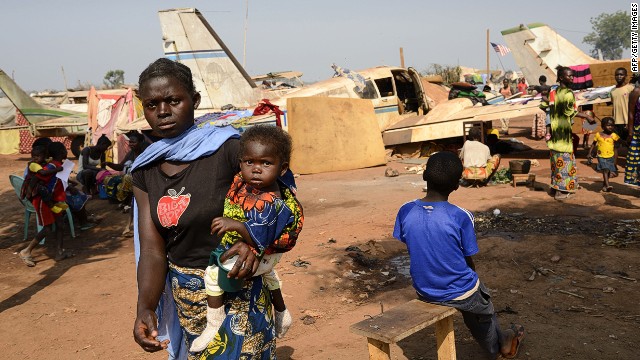
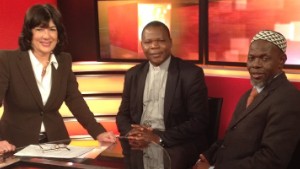
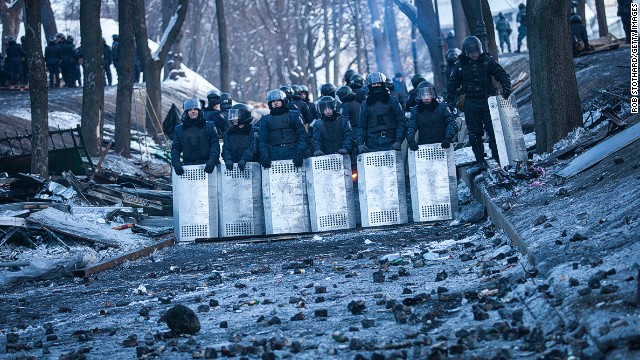
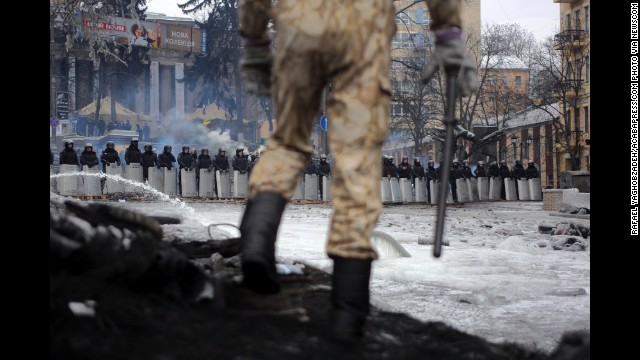 A protester stands on top of barricades in Ukraine's capital of Kiev on Tuesday, January 28. Long-running demonstrations escalated into violent confrontations this month, with police and protesters fighting in Kiev's icy streets.
A protester stands on top of barricades in Ukraine's capital of Kiev on Tuesday, January 28. Long-running demonstrations escalated into violent confrontations this month, with police and protesters fighting in Kiev's icy streets.
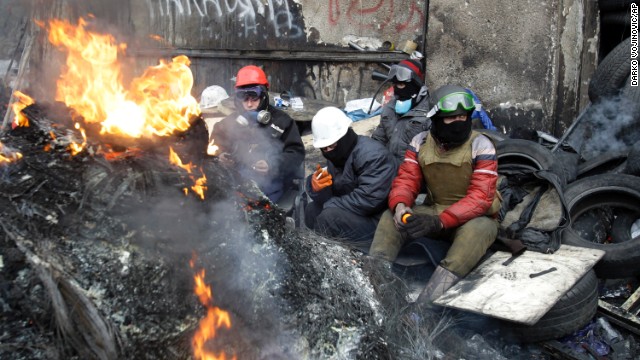 Protesters sit behind a barricade in Kiev on January 28. Protesters first poured into the streets of the Ukrainian capital in November, angered by their government's move away from the European Union in favor of closer ties with Russia. The escalation came after anti-protest legislation was passed by parliament on January 16.
Protesters sit behind a barricade in Kiev on January 28. Protesters first poured into the streets of the Ukrainian capital in November, angered by their government's move away from the European Union in favor of closer ties with Russia. The escalation came after anti-protest legislation was passed by parliament on January 16.
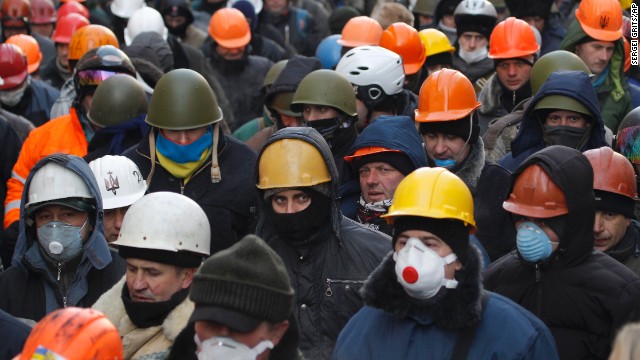 Protesters march in Kiev on Monday, January 27. Activists say they want wide-ranging constitutional reform and a shake-up of the Ukrainian political system.
Protesters march in Kiev on Monday, January 27. Activists say they want wide-ranging constitutional reform and a shake-up of the Ukrainian political system.
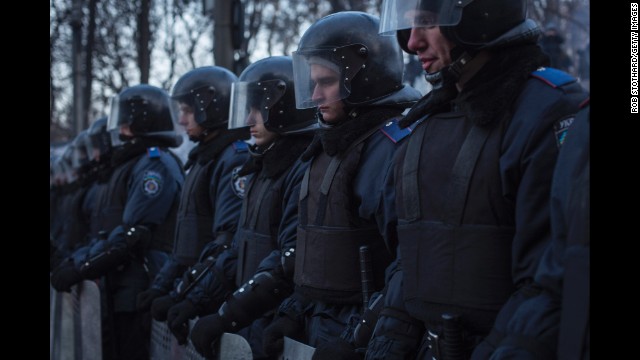 Police block a street in the Ukraine capital on January 27.
Police block a street in the Ukraine capital on January 27.
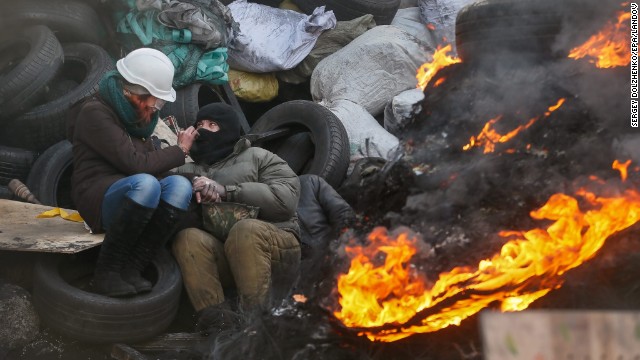 A couple try to keep warm near a fire at a barricade in Kiev on January 27.
A couple try to keep warm near a fire at a barricade in Kiev on January 27.
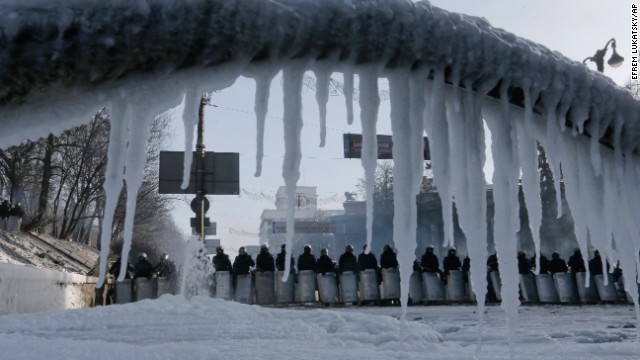 Riot police block a Kiev street from protesters on January 27.
Riot police block a Kiev street from protesters on January 27.
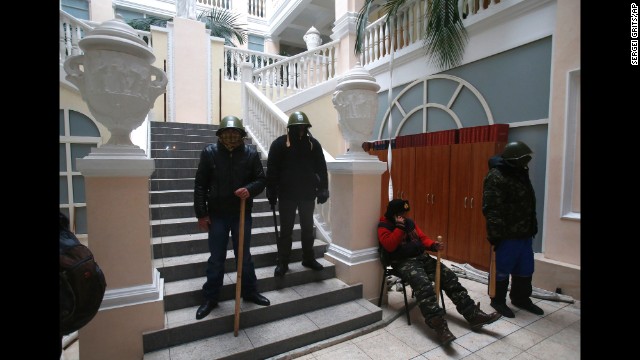 Protesters stand guard inside the Ukraine Justice Ministry in Kiev on January 27. Demonstrators later left the building because they didn't want to create any difficulties in negotiations between the government and opposition, a protest leader said. Protesters repositioned themselves outside and blocked access to the building, the leader said.
Protesters stand guard inside the Ukraine Justice Ministry in Kiev on January 27. Demonstrators later left the building because they didn't want to create any difficulties in negotiations between the government and opposition, a protest leader said. Protesters repositioned themselves outside and blocked access to the building, the leader said.
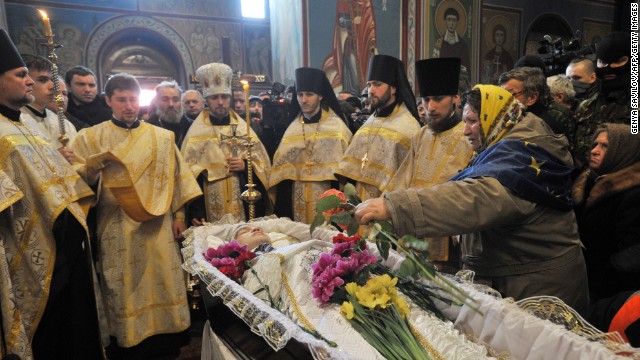 Orthodox priests lead the funeral service for slain protester Mikhail Zhiznevsky in Kiev on Sunday, January 26.
Orthodox priests lead the funeral service for slain protester Mikhail Zhiznevsky in Kiev on Sunday, January 26.
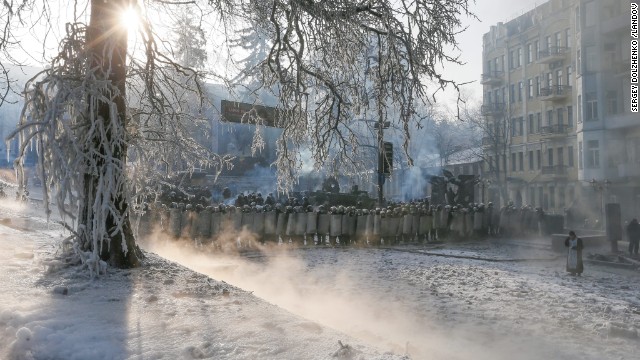 Ukrainian riot police officers stand in line during anti-government protests in Kiev on Saturday, January 25.
Ukrainian riot police officers stand in line during anti-government protests in Kiev on Saturday, January 25.
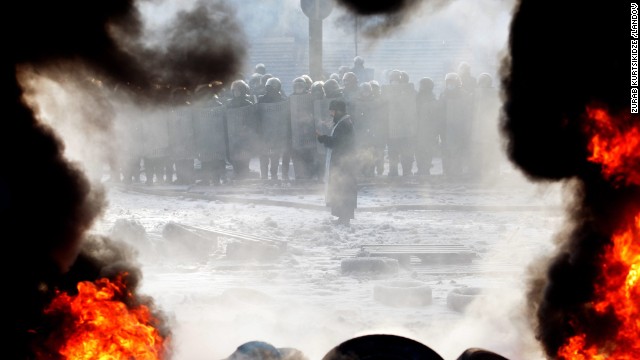 An Orthodox priest prays during protests on January 25.
An Orthodox priest prays during protests on January 25.
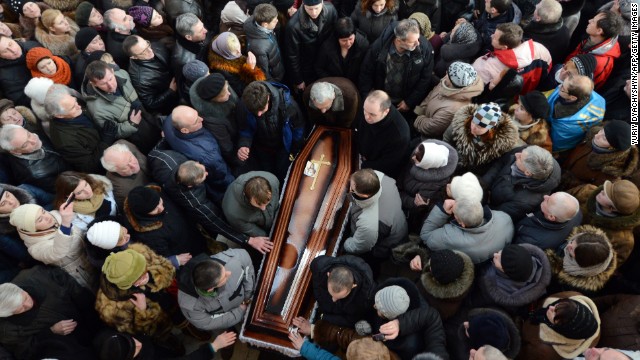 Some 10,000 Ukrainians take part in the funeral ceremony of dead protester Yuri Verbytsky in the western city of Lviv on Friday, January 24. Verbytsky was reportedly abducted on Tuesday and was found dead in a forest near Kiev on Thursday.
Some 10,000 Ukrainians take part in the funeral ceremony of dead protester Yuri Verbytsky in the western city of Lviv on Friday, January 24. Verbytsky was reportedly abducted on Tuesday and was found dead in a forest near Kiev on Thursday.
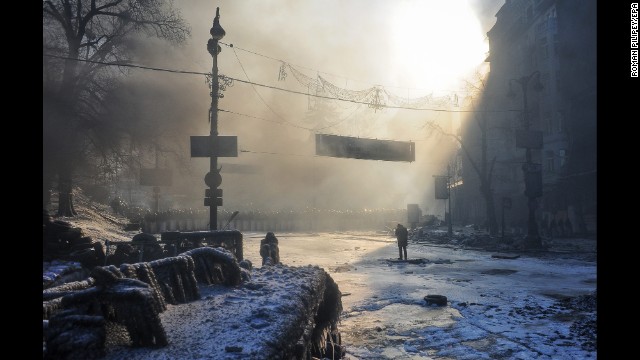 A line of Ukrainian riot police block a road on January 24.
A line of Ukrainian riot police block a road on January 24.
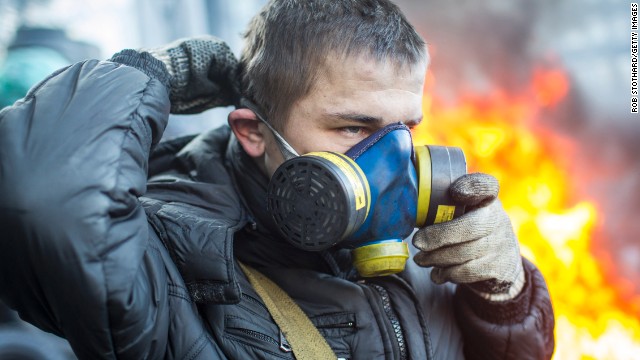 A protestor puts on a gas mask near Dynamo Stadium in Kiev on January 24.
A protestor puts on a gas mask near Dynamo Stadium in Kiev on January 24.
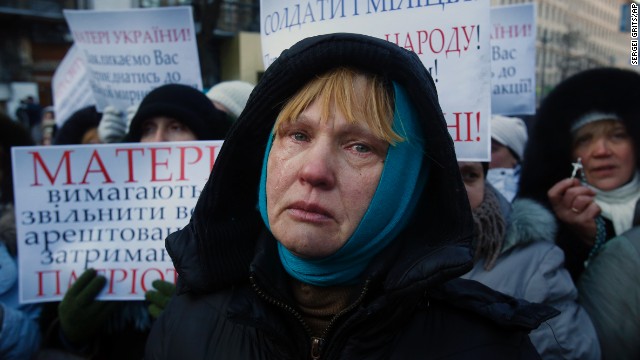 Ukrainian Oksana Tikhomirova cries as she urges riot police to stop the violence outside a government district in central Kiev on January 24.
Ukrainian Oksana Tikhomirova cries as she urges riot police to stop the violence outside a government district in central Kiev on January 24.
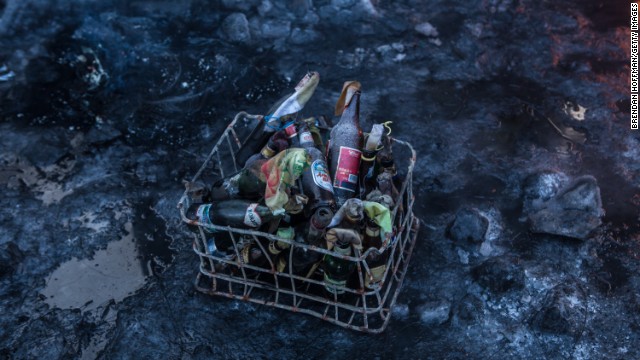 Molotov cocktails sit in a basket ready to be used by protesters in Kiev on January 24.
Molotov cocktails sit in a basket ready to be used by protesters in Kiev on January 24.
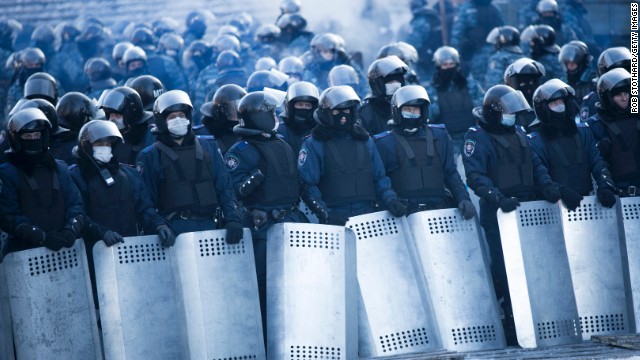 Riot police stand guard near Dynamo Stadium on January 24.
Riot police stand guard near Dynamo Stadium on January 24.
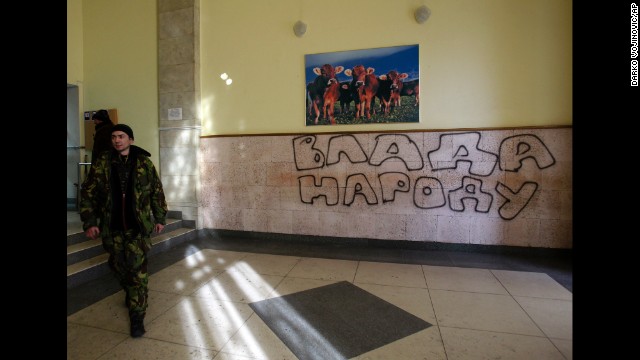 A protester passes past graffiti that reads "Government for People" in the Ministry of Agricultural Policy building in Kiev on January 24.
A protester passes past graffiti that reads "Government for People" in the Ministry of Agricultural Policy building in Kiev on January 24.
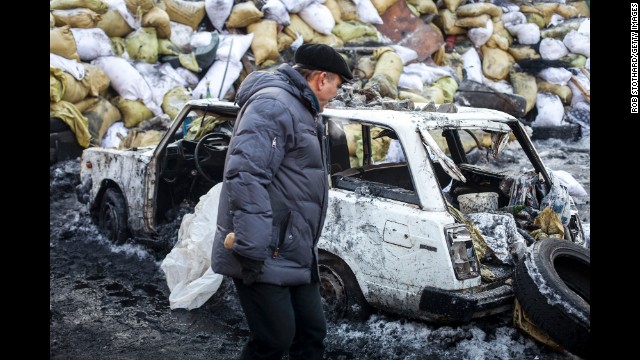 A man walks past the wreckage of a car on January 24.
A man walks past the wreckage of a car on January 24.
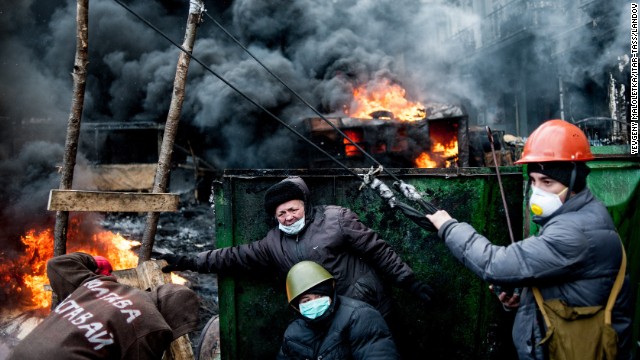 Ukrainian protesters use a huge catapult to throw stones at riot police as tires burn in Kiev on Thursday, January 23.
Ukrainian protesters use a huge catapult to throw stones at riot police as tires burn in Kiev on Thursday, January 23.
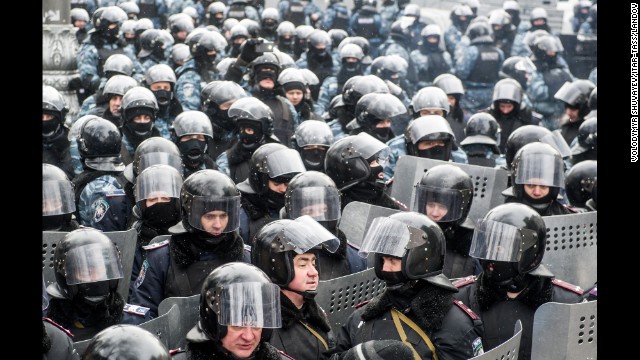 Riot police officers gather in Kiev on January 23.
Riot police officers gather in Kiev on January 23.
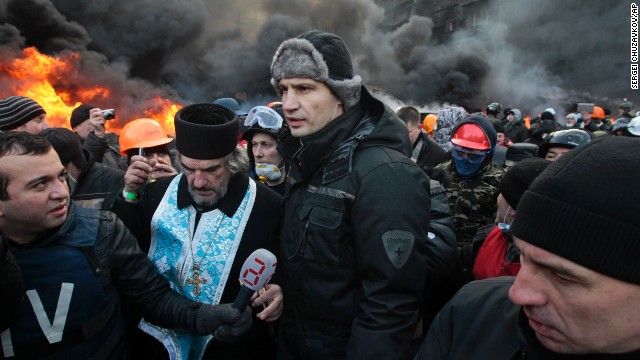 Opposition leader Vitali Klitschko, center, addresses protesters near the burning barricades between police and protesters in central Kiev on January 23.
Opposition leader Vitali Klitschko, center, addresses protesters near the burning barricades between police and protesters in central Kiev on January 23.
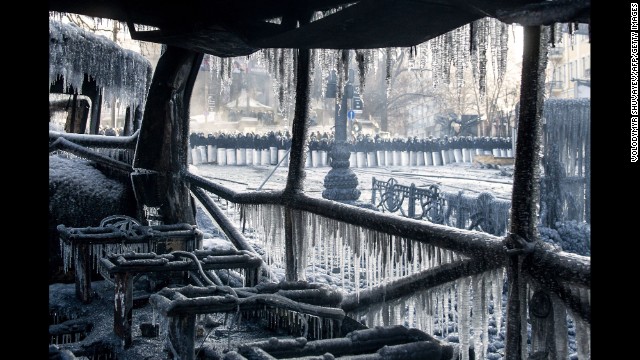 Riot police stand guard near a burnt-out bus covered in icicles in Kiev on January 23.
Riot police stand guard near a burnt-out bus covered in icicles in Kiev on January 23.
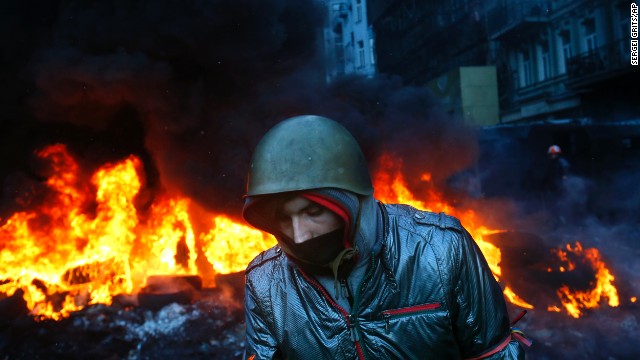 A protester walks past burning tires in Kiev on January 23.
A protester walks past burning tires in Kiev on January 23.
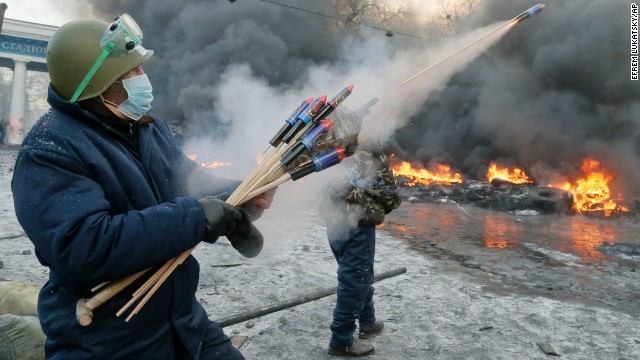 A protester shoots fireworks at police during clashes in Kiev on January 23.
A protester shoots fireworks at police during clashes in Kiev on January 23.
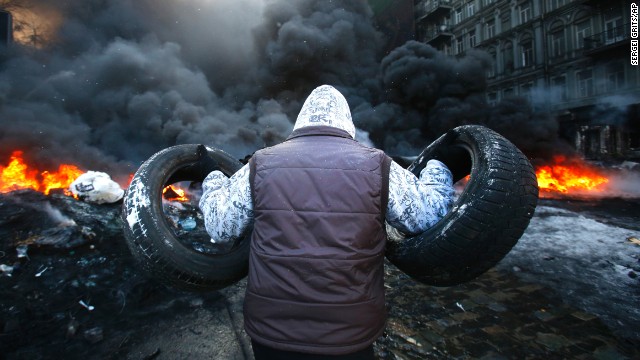 A protester carries tires toward a fire on January 23.
A protester carries tires toward a fire on January 23.
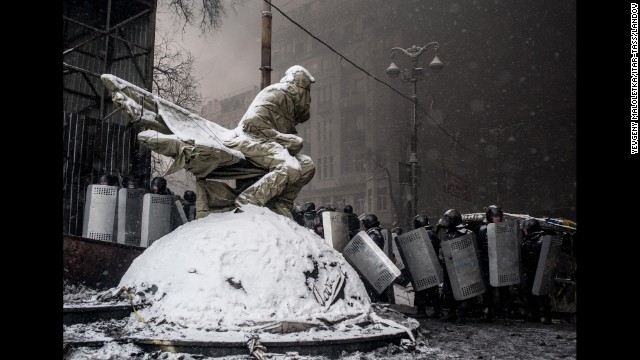 Riot police officers line up in Kiev during clashes on Wednesday, January 22.
Riot police officers line up in Kiev during clashes on Wednesday, January 22.
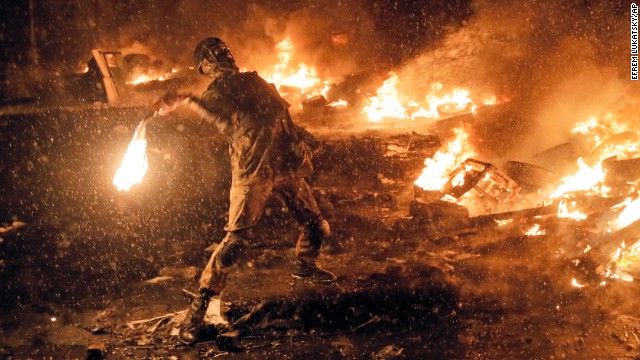 A protester throws a Molotov cocktail on January 22.
A protester throws a Molotov cocktail on January 22.
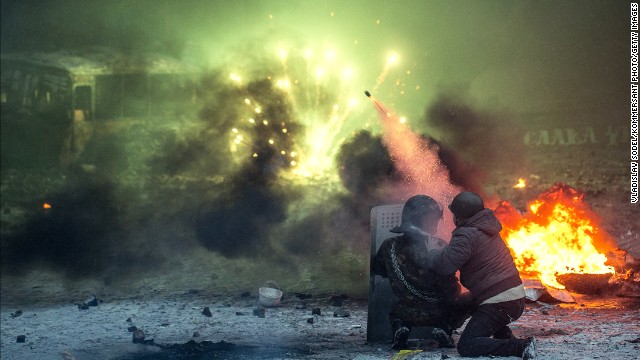 Protesters shoot from behind a shield among burning automobile tires in Kiev on January 22.
Protesters shoot from behind a shield among burning automobile tires in Kiev on January 22.
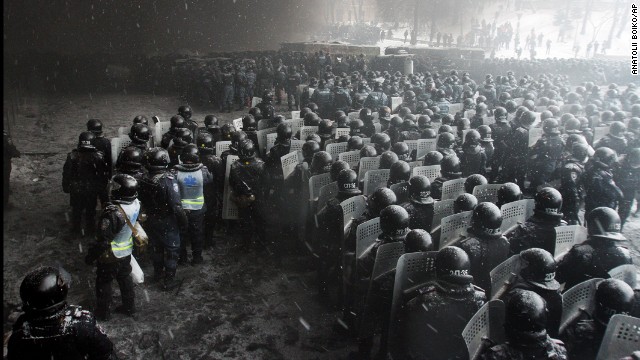 Riot police officers gather as they clash with protesters in the center of Kiev on January 22.
Riot police officers gather as they clash with protesters in the center of Kiev on January 22.
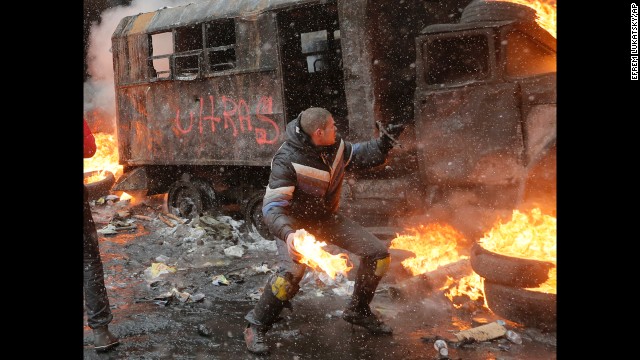 A protester throws a Molotov cocktail during clashes with police in central Kiev.
A protester throws a Molotov cocktail during clashes with police in central Kiev.
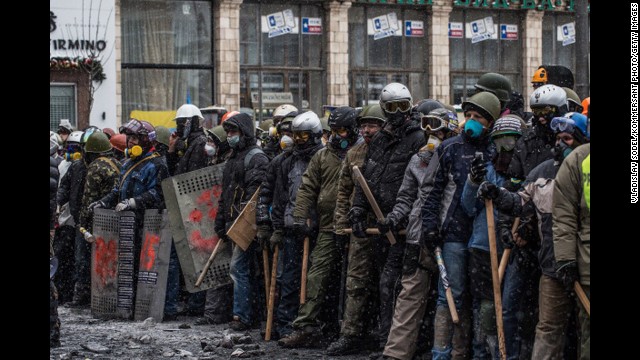 Ukrainian protesters during a mass action of opposition on Grushevsky Street.
Ukrainian protesters during a mass action of opposition on Grushevsky Street.
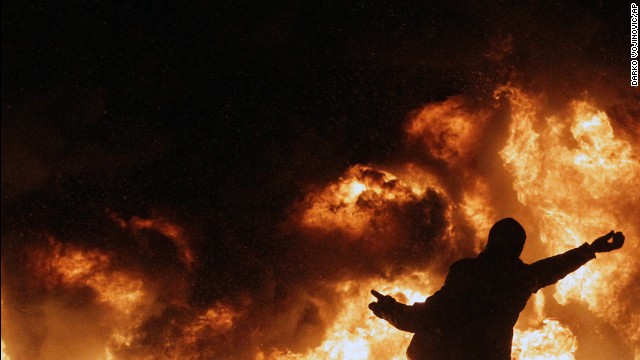 A protester throws a stone in front of a plume of fire and smoke during clashes with police in central Kiev.
A protester throws a stone in front of a plume of fire and smoke during clashes with police in central Kiev.
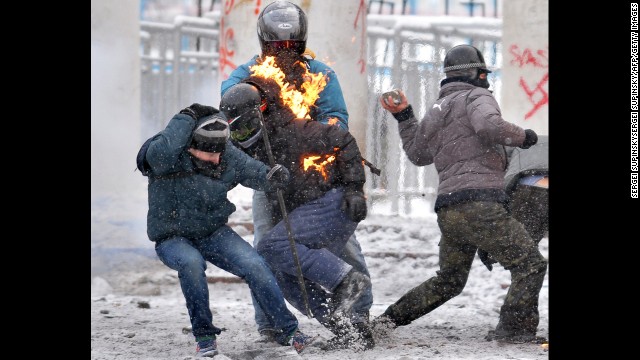 Flames leap off a protester during clashes with police on January 22.
Flames leap off a protester during clashes with police on January 22.
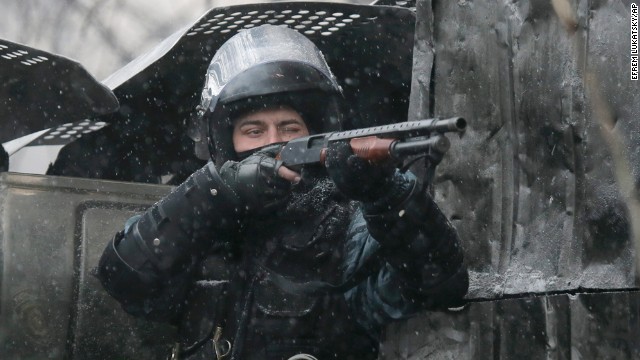 A police officer aims his shotgun during clashes with protesters.
A police officer aims his shotgun during clashes with protesters.
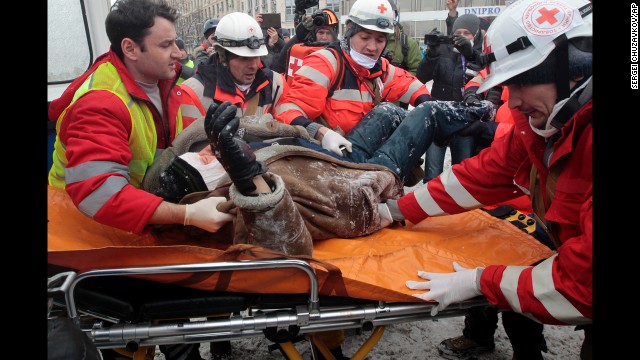 Paramedics put a wounded man on a stretcher and into a medical vehicle.
Paramedics put a wounded man on a stretcher and into a medical vehicle.
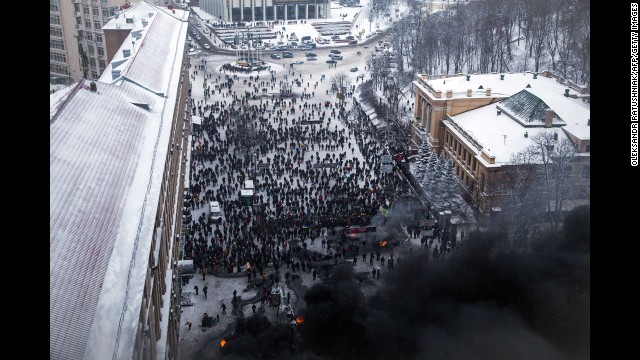 Ukrainian police storm protesters' barricades in Kiev amid violent clashes on January 22.
Ukrainian police storm protesters' barricades in Kiev amid violent clashes on January 22.
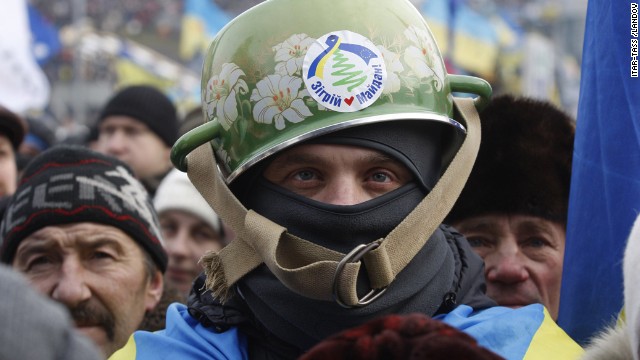 A European integration supporter at Independence Square in central Kiev.
A European integration supporter at Independence Square in central Kiev.
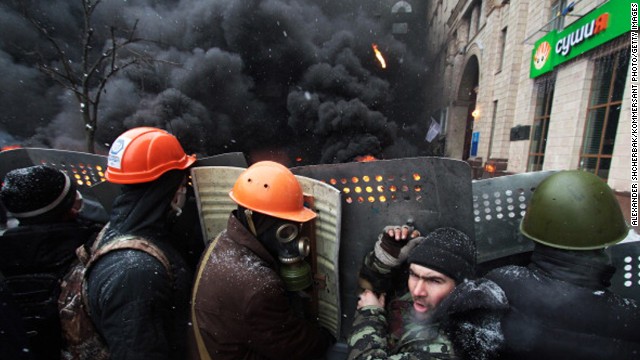 Protesters in front of burning tires on Grushevsky Street.
Protesters in front of burning tires on Grushevsky Street.
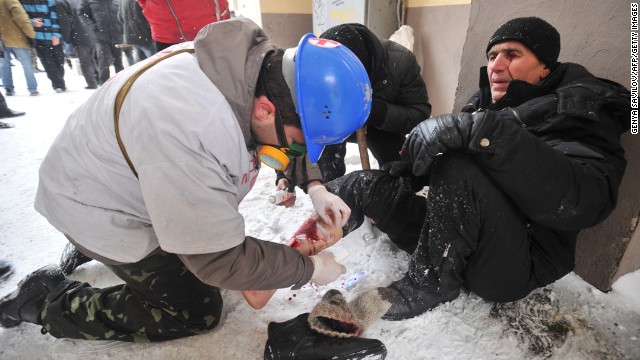 A medic treats an injured protester's leg during violent clashes between demonstrators and police.
A medic treats an injured protester's leg during violent clashes between demonstrators and police.
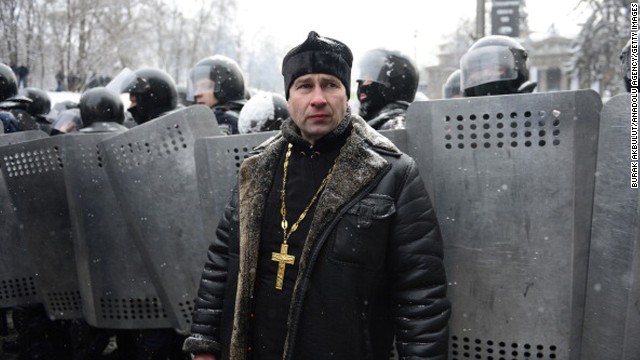 A Ukrainian man stands in front of riot police on January 22.
A Ukrainian man stands in front of riot police on January 22.
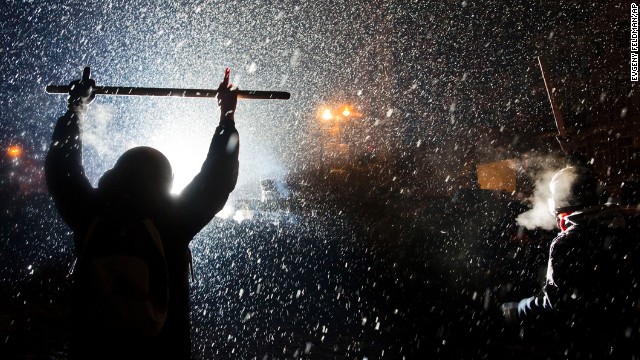 Protesters clash with police in Kiev as snow falls on January 22.
Protesters clash with police in Kiev as snow falls on January 22.









































